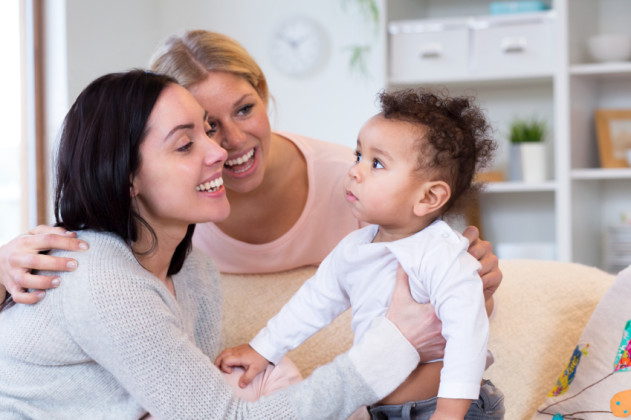Yes, every child needs a family, but the composition of the family is not what’s relevant.
As co-mamas to a 7-year-old boy named Bobby, my partner Valerie and I are subject to a lot of negative judgments about our parenting. People who will never meet us declare us to be unfit parents simply because she and I are in love. There are many studies designed to prove that children of gay and lesbian parents are irreparably harmed by their social circumstance. However, none of the work stands up to scientific or common sense scrutiny.
After all, children are born into a wide variety of family structures. Parents all come to their children with distinct sets of strengths and weaknesses. Children have hugely variant sets of emotional and physical needs. How could one attribute of a parent’s identity either assure or compromise a child’s well-being?
As a lesbian mama, one of the most common criticisms I hear is that Bobby will suffer without a father. In our patriarchal culture, many obsess that there must be a man to hold that title for every child. But in and of itself that title has no value.
Does my son benefit from the compassionate and strong men who are in his life? Of course, just as he benefits from the compassionate and strong women around him.
Will Bobby have times in his life when he will specifically seek out the advice or companionship of other males instead of his mothers? Certainly. At different points in our lives we all seek out people who share some important facet of our identity.
Do either of those emotional needs require him to have a father? Not at all.
In my opinion, raising a child effectively is not about adhering to a rigid set of roles and rules. As a parent, if you are truly open to a child self-actualizing and discovering their best self, you have to be flexible and responsive to their dynamic set of needs.
Bobby benefits from having male role models in his life in the same way a gay or lesbian child benefits from forming relationships within the LGBTQIA community or the way a scientifically motivated child of two artists benefits from a left-brained mentor.
No set of parents can meet all the emotional needs of their children. If a child is restricted to being mentored only by their parents and like-minded adults, important facets of their identity will be suppressed or lost completely. My job as a mother is not to be everything to Bobby. My job is to teach him to navigate the world to get his unique needs met.
My aspirational model of childrearing does not involve forcing a set of social relationships into a model of traditional marriage or coupledom. Yes, every child needs a family, but the composition of the family is not what’s relevant. What matters is that each child has a set of adults who provide for their basic needs and emotional security. Family is the group of people who will love and forgive a child even when they are not being their best selves. Family will allow a child to experiment and discover their true identity without any fear of stigma or judgment. Family is the ultimate safety net.
My son Bobby has Down syndrome. As he grows older, he will need to develop a sense of meaning around that diagnosis. Right now my partner and I provide him with practical, medical, and therapeutic supports. We intervene in instances of bullying or discrimination and will continue to do so until he is ready to advocate for himself. Most of all, we will teach him the importance of making up his own mind about who he is or wants to be. Social forces will try to define him only as a person with Down syndrome. He is so much more.
However, neither Valerie nor I have Down syndrome. We will not try to box in that portion of his identity by telling him how he should feel about his diagnosis. Rather, we will try to give him ample opportunity to be in relationships with both children and adults with Down syndrome who can share their own perspective. We will encourage him to spend time in groups where he is the only person with his diagnosis, to find what is nurturing and what is challenging about different environments. We will help provide Bobby with the experiences he needs to make up his own mind about what his diagnosis means to him.
Same as we will provide him with an environment where he can discover what it means to him to be a man. In fact, if we do our job well, we will give him access to a multitude of communities that align with the various components of his identity.
If you want to judge me as a mother, judge me on how well I live up to my aspirations. Judge me on the humility I show when Bobby pulls me in a direction I am not expecting. Do I pull back, enforcing conformity? Or do I let go, encouraging self-discovery? Is my son loved? Does he feel emotionally secure?
All of these are the jobs of parenting, not the enforcement of traditional roles and social norms. The latter are the work of holding up an outdated, patriarchal model of society. We need to stop confusing the two.
Anne Penniston Grunsted writes about parenting, disability, and family life from her perspective as a lesbian mama. She has been published in The Washington Post, Brain, Child Magazine, Mamamia, and won the 2014 Nonfiction prize from Beecher’s Magazine. She lives in Chicago with her partner and son.
Other Links:

